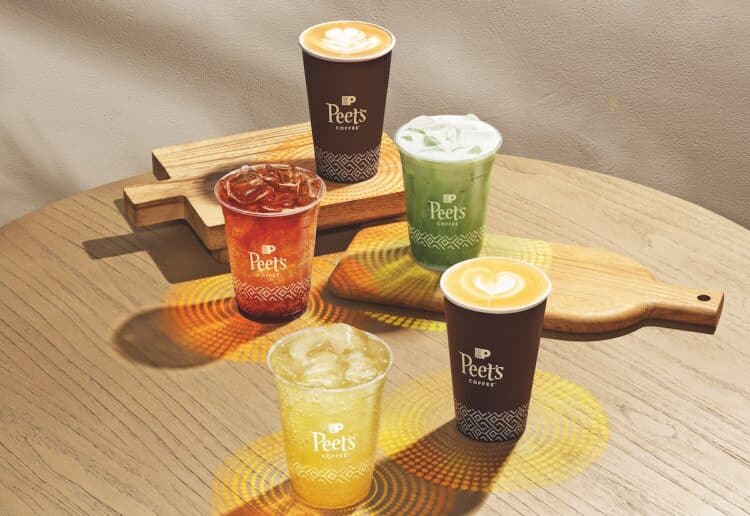Protein coffee has become huge business in the United States, but has the latest ‘health’ trend got legs to go international?
Protein-supplemented coffee is one of the latest trends to sweep the American coffee industry, with proffee aligning itself under the wellness and functional-drinks umbrella that has gained momentum on social media.
Popular among health-conscious individuals and fitness enthusiasts, the fusion beverage is marketed as a convenient way to boost protein intake while enjoying the energising effects and taste of coffee. In the past year, Starbucks, Peet’s Coffee, and Dutch Bros have all released protein coffee ranges at their venues in the United States (US), while ready-to-drink producers have embraced the trend for a while.
But will there be a broader pickup at cafés internationally? Filipa Aguiar Loureiro, Head of Retail Product Marketing & AFH at Peet’s Coffee, says new products like proffee reflect the global coffee industry’s current climate, which is largely driven by trends made popular by Gen Z consumers.
This year, Peet’s Coffee released a Vitality Menu comprising protein-enriched lattes, immunity boosting sparkling beverages, and coconut-water-based options. Crafted with Bob’s Red Mill Whey Protein Powder, the proffee latte options include vanilla, golden, and matcha lattes.
“The menu was born from the growing demand for functional coffee that goes beyond the usual caffeine boost,” says Aguiar Loureiro.
“As trends like protein coffee take off on social media, it’s clear consumers are looking to get more out of their daily rituals.”
The Peet’s research team identified a strong connection between the desires of Gen Z and Millennial customers and its functional products. The protein-enriched lattes were found to be popular among the two consumer groups, driving engagement with the brand.
“Among the protein flavours offered, vanilla drove the highest sales overall, while matcha attracted the most Gen Z engagement. Looking ahead to 2026, we see a clear opportunity to strengthen sales and expand the appeal of this format even further,” she says.
With younger generations the main users of social media, utilising platforms such as Instagram and TikTok is a key route for Peet’s to reach its target audience.
“Social media is where functional favourites like protein coffee gain momentum, as consumers share creative ways to boost their brews,” says Aguiar Loureiro.
“These viral moments are reshaping what people expect from their daily cup. We saw this shift as an opportunity to bring these trends to life and team up with dietitian and recipe creator Sammi Brondo to offer tips on how to incorporate functional-focused sips into everyday routines.”
Although the popularity online has converted into in-person sales for Peet’s, the proffee craze is yet to cement itself as one of the brand’s stable coffee choices. Traditional espresso-based drinks remain the most popular options among its customers.
“While these functional offerings are gaining traction, they remain niche compared to our core espresso beverages and are not yet mainstream in the broader market,” Aguiar Loureiro says.
“That said, we’ve found them to be highly complementary – driving incremental sales without cannibalising our traditional menu. In fact, our core espresso recipes experienced growth during the same period protein lattes were featured.”
Alongside this new league of functional café beverages, established ready-to-drink (RTD) protein coffee options have also risen in popularity. Companies such as Starbucks, Brust, and Quest have released new products that are marketed as beverages for the busy, health-conscious individual.
However, this interest in coffee with benefits isn’t new. According to a 2018 research study by Mintel, US RTD coffee consumers wanted options that include antioxidants (47 per cent), ingredients that boost brain health (40 per cent), have anti-inflammatory agents (35 per cent), or have added probiotics (30 per cent).
What’s more, a third (35 per cent) of respondents were interested in coffee products with added protein. Peet’s Coffee’s is expecting the health and wellness arena to become a core component of consumer behaviour going forward.
Over the next two to three years, the team believe the coffee wellness trend will continue building momentum. Aguiar Loureiro says they are expecting to see more innovation in functional ingredients like protein, vitamins C and D, and coconut water.
“Health and wellness are quickly becoming core to how consumers experience specialty coffee – and that momentum isn’t slowing down,” she says.
“People are no longer just chasing a caffeine kick: they’re looking for drinks that support their overall lifestyle – from immune health to sustained energy.”
This article was first published in the September/October 2025 edition of Global Coffee Report. Read more HERE.





